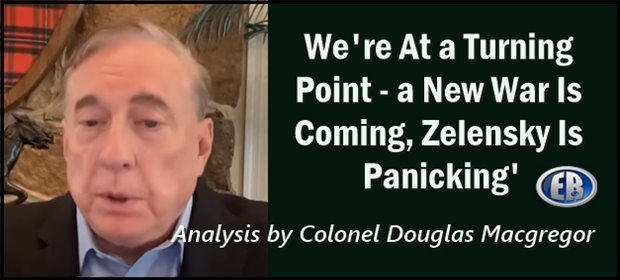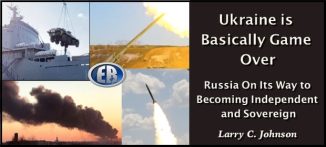
ER Editor: The interviewer in the video from two days ago opens with an introductory summary of what Russia is doing in terms of strikes within Ukraine and the damage being done currently.
********
US Colonel Douglas Macgregor: “Mr. Zelensky is in a panic”
FRONT NIEUWS
Morris: The Western media, especially the Washington Post today, is calling the attacks on Ukraine a turning point in this war. (…) Are we actually at a turning point and which way does the tide turn?
Macgregor: It is a turning point of sorts, perhaps not exactly as the Washington Post suggests (…) Let’s talk about the evolution of this conflict over the past seven months. War is not static, it is a constantly changing sea. Even though no one in the West wants to admit it, President Putin has been extremely reluctant to use his military might for the past seven months. We have never seen more than 20 percent of Russian ground forces in Ukraine. And many of the regular ground forces were also gradually withdrawn after the first four months, after the Ukrainian army, which we had built up over several years, was largely destroyed. What remains at the moment in Ukraine is a mix of different volunteers, militias, some allied forces such as the Chechen, Cuban and Cossack volunteers who have proved to be very good fighters, plus Wagner’s mercenary force which has also proved very efficient in ground combat. But the actual Russian army with its regular combat forces has largely withdrawn. I actually thought they would come back at the end of August, but apparently it was decided not to. What is currently happening in the Kremlin, I think, is that Putin and his advisers are realizing that there is no chance of ending this conflict through negotiations. But he probably held on to this hope even in April, when we and London had forbidden Zelensky to accept compromises such as neutrality. Now we are dealing with a different Russia. Yesterday we saw 202 missiles attack different targets all over Ukraine in three waves. This is something they could always have done. They have their precision weapons just like us. This time, however, they have hit not only the so-called critical infrastructure, but also the headquarters of the Secret Service, an organization notoriously engaged in killing people and recruiting recruits at gunpoint and forcing them into enemy fire, as well as analysis centers, proving that there is nowhere to be found. In Ukraine nothing happens without them knowing. Even in Western Ukraine, nothing happens without Moscow knowing. There is nothing there that the Russians cannot reach and destroy. I think we’ve had a taste of what’s to come in the fall. I predict large-scale ground offensives by the Russians once the ground is frozen, which will annihilate the Ukrainian forces.
Morris: The western media is trying to portray these air strikes as insignificant. Presumably they don’t really hurt Ukraine. This is what I’ve heard from some propaganda media in the last 24 hours. As I go through the laundry list of targets affected, I have to wonder. Polish troops who had joined to invade Russia have been hit, NATO targets have been hit, the SBU, thermal power plants, there are currently masses of people fleeing Ukraine because they have no fresh water, no running water, no electricity, no internet. So the Western media says that the attacks are insignificant, that Ukraine is okay. What do you say to that?
Macgregor: Biden or his advisers felt compelled to assure Zelensky that we would continue to support him and supply him with supplies. There will be no change. At the same time, Zelensky begged for more air defense weapons as 80 percent of Ukraine’s air defenses have been destroyed by Russian missile strikes. If someone suggests that this was trivial, we just have to look at the development and very quickly come to the conclusion: oh, this isn’t right. Mr. Zelensky is panicking. Undoubtedly, the Ukrainians now have serious logistical problems in moving things back and forth in the country. Suddenly, Russia has decided that enough is just enough – and to give up the restraints of the past.
Morris: Back to the air defense systems. Zelensky, as you just said, has asked for more of these systems. The US seems to want to settle. (…) What’s in it for Ukraine? Explain who would serve them. Would they be unmanned or would NATO soldiers take care of the air defense systems? Ukrainian soldiers?
Macgregor: These HIMARS systems are usually managed by so-called contractors. These are probably Americans in civilian clothes who have an employment contract with the Ukrainian government or who work under one of the other mechanisms we have put in place. They could be Europeans. But these systems require a long training period before they can be operated effectively. Not to mention the maintenance. NASAMS, one of the best defense systems against ground-to-ground missiles in the world, a highly complex radar, was located in Kiev – and was destroyed. How do you disable such a system? Just because of the large amount of missiles the system would have to defend against. That’s the way to get around any system, no matter how good it is. That’s what the Russians did. Zelensky’s forces aren’t trained for this.
Morris: What is the role of NATO forces at this turning point, given the decimation of the Ukrainian military? (…) The best forces have been eliminated. Replacing them is not easy. Will they be replaced by NATO troops? By contract forces? Who will fill the hole, man the ship?
Macgregor: Well, the people who are in direct ground fights are Ukrainians. There are reports of large numbers of Polish soldiers in Ukrainian uniforms replacing Ukrainian casualties. This has happened over the last few months because – as you pointed out – most of the best Ukrainian units no longer exist. They have been killed or injured. The Ukrainians have fatalities of about 100,000 men and perhaps 200-, 300- or even 400,000 wounded. This was once an army of 600,000 men. Remember, we built this army in 8 years with the aim of attacking Russia. That’s what it was founded for. That’s why the Russians attacked it. We also wanted to station missiles in eastern Ukraine that could have threatened Russia. So again, Eastern Ukraine had to be neutralized and that is why the Russians intervened there. In doing so, as I indicated earlier, they have exercised great restraint. First, this is a Slavic country, another Christian Orthodox Slavic country. The Russians have no interest in killing large numbers of people there. They also didn’t want to destroy a lot of infrastructure. The areas where the Russians are in the east and south of Ukraine were already Russian before. They wanted to ensure equal rights for Russians and other Ukrainians within Ukraine. That was the intention of the Minsk agreement, which was never complied with. Right now it’s like this: they’re looking at cannon fodder. People without proper training are rounded up, put in uniforms, handed an AK 47 and put in tanks or other vehicles. Do they have any training? A few have had a good one, most others have almost none. Consequently, the number of victims will be very high. But once you leave the so-called tactical level and look into the higher echelons, you’ll find NATO personnel there doing all the magic. People from France, Britain, the United States and other countries are working out the strategies and suggesting what to do next. There are indications that the Ukrainian president has not taken our advice very seriously. He is out to attack, attack and attack again. He probably sees himself in a position where he has everything to lose – but nothing to gain. He clearly thinks he can wear out the Russians. The fact is that for every Russian killed or injured, five, six or seven Ukrainians are killed or injured. It’s worth it for the Russians. They have a fairly cheap defense, while Ukraine can’t afford extremely expensive attacks. Ukraine is in a very serious crisis. Maybe it won’t survive. Especially when the expected Russian offensive starts in November when the ground is frozen, I don’t know what the Ukrainians will do about it. Then they face the regular Russian army, a large number of Russian troops, no longer just volunteers and allied units. They will have the operational freedom to do what many Russians have wanted from the start. Anything that appears dangerous or poses a threat to them is addressed and destroyed. A very different war is coming. while Ukraine can afford extremely expensive attacks. Ukraine is in a very serious crisis. Maybe it won’t survive. Especially when the expected Russian offensive starts in November, I don’t know what the Ukrainians will do about it. Then they face the regular Russian army, a large number of Russian troops, no longer just volunteers and allied units. They will have the operational freedom to do what many Russians have wanted from the start. Anything that appears dangerous or poses a threat to them is addressed and destroyed.
Morris: You predict that for November, so for the next few weeks?
Macgregor: Well, I’m not from the Russian General Staff, but if I look at the deployment that’s going on right now in the theater of war – and they’re coming in groups of 50,000 – around Ukraine and various other places, where they’re doing a lot of training and preparation now, they are going to unite for operational axes of advance, something we expected to happen at the start of the war, but didn’t happen then. They will then strike very hard and very deeply. Everything in Ukraine that hinders their advance will then be destroyed. That will be their mission: Destroy and destroy the enemy. Where do they stop their advance? I assume at the Dnieper. They were never interested in crossing the Dnieper. West of the Dnieper lies historic Ukraine. That’s where the Ukrainians live. Odessa will go to the Russians, Kharkiv too – and there’s not much we can do about that. No one in the West will be able to do anything about it unless they want to go to war with Russia. But I don’t see anyone wanting to do that. The only exception may be the Poles, but even there support for this war is crumbling. In the US, almost no one cares. We’re dealing with the hurricane in Florida. That’s also why we got away with what we’ve done in Ukraine so far. There were so many bad political decisions because Americans didn’t care. That has not changed much, even though it is slowly being realized that nothing they have been told in this regard is true.
Morris: We’ve been talking about this for weeks. What happens if Odessa falls. Ukraine is landlocked with no access to the sea. What will happen to Zelensky?
Macgregor: We can only speculate about that. I don’t know what’s going to happen to Zelensky. He could be removed by his own people or get on a plane to one of his estates, fly to Miami or Venice. As for Odessa, Odessa has always been a Russian city, even though about 50 percent of Ukrainians now live there after the Russians were expelled. The same goes for Kharkiv. Both cities were Russian cities from the beginning and Russian was always spoken. The Russians don’t take this nonsense any longer. They will pursue their goals as Russians always pursue their goals: Methodically sophisticated and ruthless. The new commander who has just been appointed is a capable person with a good reputation. He has done an excellent job for the Russians in Syria, he’s a hardliner and has all the options at his disposal that his predecessors didn’t get. This will be a turning point, but in a different way than the Washington Post would have you believe.
Morris and Macgregor then discuss Belarus and the fact that Russia is modernizing the aging Belarusian military. However, Macgregor thinks the Belarusians will be more likely to focus on their border with Poland.
Douglas Macgregor is a retired United States Army colonel, political scientist, military theorist, author and consultant. On July 29, 2020, President Donald Trump appointed him to succeed Richard Grenell as United States Ambassador to Germany. However, the Senate has not confirmed the nomination.
Via Freiewelt.net
************
Source

••••
The Liberty Beacon Project is now expanding at a near exponential rate, and for this we are grateful and excited! But we must also be practical. For 7 years we have not asked for any donations, and have built this project with our own funds as we grew. We are now experiencing ever increasing growing pains due to the large number of websites and projects we represent. So we have just installed donation buttons on our websites and ask that you consider this when you visit them. Nothing is too small. We thank you for all your support and your considerations … (TLB)
••••
Comment Policy: As a privately owned web site, we reserve the right to remove comments that contain spam, advertising, vulgarity, threats of violence, racism, or personal/abusive attacks on other users. This also applies to trolling, the use of more than one alias, or just intentional mischief. Enforcement of this policy is at the discretion of this websites administrators. Repeat offenders may be blocked or permanently banned without prior warning.
••••
Disclaimer: TLB websites contain copyrighted material the use of which has not always been specifically authorized by the copyright owner. We are making such material available to our readers under the provisions of “fair use” in an effort to advance a better understanding of political, health, economic and social issues. The material on this site is distributed without profit to those who have expressed a prior interest in receiving it for research and educational purposes. If you wish to use copyrighted material for purposes other than “fair use” you must request permission from the copyright owner.
••••
Disclaimer: The information and opinions shared are for informational purposes only including, but not limited to, text, graphics, images and other material are not intended as medical advice or instruction. Nothing mentioned is intended to be a substitute for professional medical advice, diagnosis or treatment.






Leave a Reply